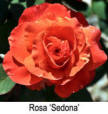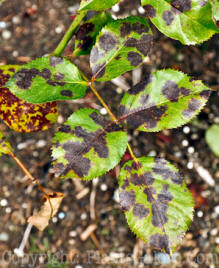|
 |
|
 |
|
 |
 |
 Black spot is a fungal
disease that can cause serious damage to many types of
roses.
Hybrid tea roses seem to be especially
susceptible. Black spot is a fungal
disease that can cause serious damage to many types of
roses.
Hybrid tea roses seem to be especially
susceptible.
|
 |
|
 |

|
 As the name implies,
this disease appears as dark spots in the leaves
that may grow together. Once enough of the leaf
tissue is infected, the leaf will turn yellow and
drop off. In severe cases, the plant may lose all
its foliage by mid to late summer. Additionally,
there may be spots on branches and twigs. As the name implies,
this disease appears as dark spots in the leaves
that may grow together. Once enough of the leaf
tissue is infected, the leaf will turn yellow and
drop off. In severe cases, the plant may lose all
its foliage by mid to late summer. Additionally,
there may be spots on branches and twigs.
Spots form on the leaves and
enlarge into large, dark circles with irregular margins. Several spots
may grow together. As spots increase on a leaf surface, the leaf
generally turns yellow, then falls prematurely. In addition, similar
dark lesions form on twigs and rose hips. Infected plants are stunted
with unsightly foliage and produce fewer, paler colored flowers. A
severely infected plant may be entirely defoliated by midsummer.
Since this is a fungal disease, it spreads by
spores. They blow into the air or are splashed in
water from last year's leaves and infected stems.
Infections are generally much more severe if the
spring is warm and moist.
|
 |
 |
 |
One source of this
disease is the spores that form on the previous
season's leaves and infected twigs. Therefore, one
prevention technique is sanitation. Clean up all the
leaves and infected canes at the end of the year and
dispose of them away from the garden.
As always, try to
find black spot resistant cultivars of
roses to
plant. This is especially true when choosing hybrid
tea roses.
|
 |
 |

|
-
Fungicides - commercially available
fungicides
are labeled for control of black spot on roses.
These products have to applied before the infection
occurs. Most rosarians who use fungicides need to
reapply them periodically through the summer. That
can be a lot of work.
-
Sanitation - as mentioned above.
-
Irrigation - make sure sprinklers do not wet the
foliage frequently. In order for the spores to
survive, they must be in a moist environment. If you
need to irrigate, direct the water toward the roots
and not onto the foliage.
-
Home Remedies - There are many home remedies
that people us to try to prevent black spot. Some
people swear by them while others swear at them.
|
|
 |
|
Note: We
have provided some general information and
observations on this topic aimed at the home
gardener. Before you take
any serious action in your landscape, check
with your state's land grant university's
Cooperative
Extension
Service for the most current,
appropriate, localized recommendations. |
|
 |
|



